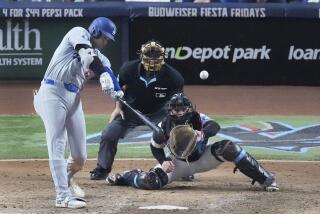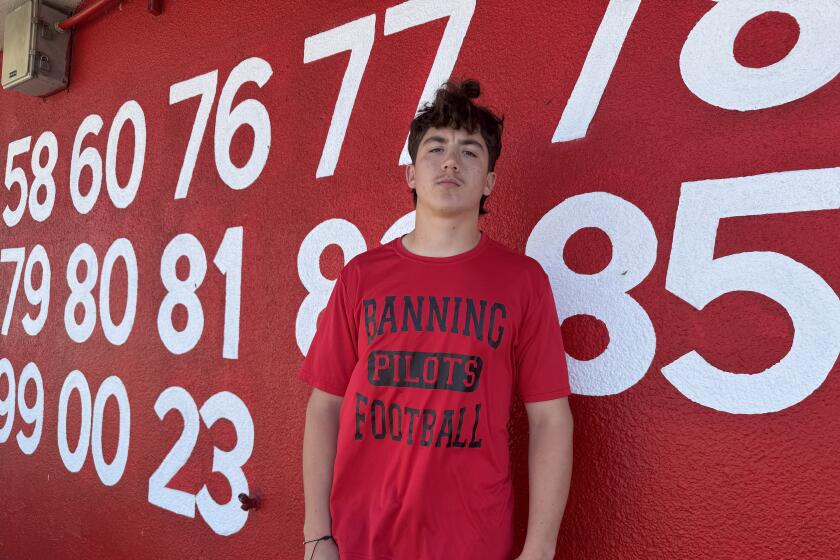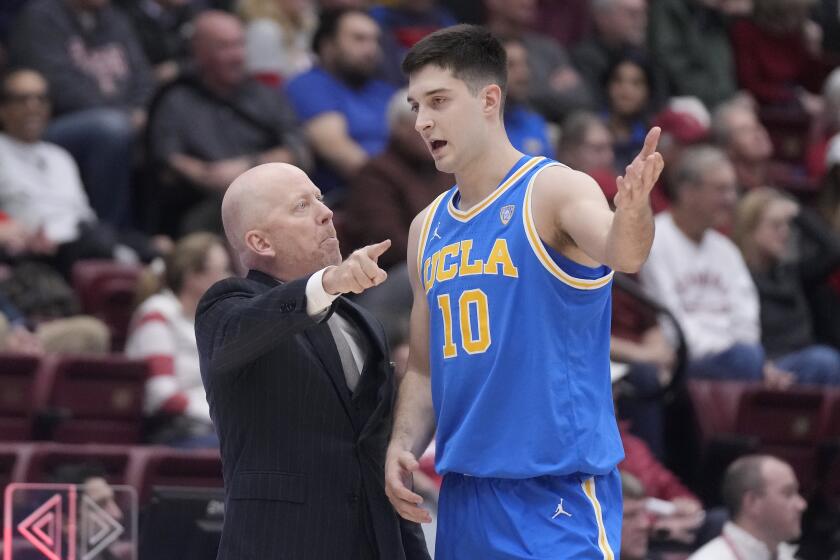Performance Belies His Age
Adan Farias removed his cowboy hat, ran his fingers through his short black hair and looked up with a sheepish grin.
“That was a bad day,” he said, as he jabbed the toe of his cowboy boot in the dirt.
Farias, a 21-year-old quarter horse trainer at Los Alamitos Race Course, had just watched all four of his mounts that night fail to finish in the money.
“It happens that way sometimes,” Farias said. “Tomorrow we’ll do better.”
Easy for him to say. Farias, who was named “Newcomer of the Year” last season, has the highest winning percentage this season of any trainer at Los Alamitos. Through Friday, he was ranked fifth in wins, despite having approximately half the starts of most of his counterparts.
Seven months ago Farias considered this a temporary gig; it was just a job to put him through college. Now, the path isn’t quite as clear. Farias has discovered that his impressive debut as a trainer wasn’t a fluke and suddenly his dream of joining the FBI has been put on hold.
Part of it was the money.
Farias expects to make more than $100,000 this year, not bad for someone who has held a trainer’s license for a little more than a year.
The grueling schedule was another factor.
Farias would begin his day at 5 a.m. at the track. He would leave at 11 a.m. to make a noon class at UCLA, returning to the track at 4 p.m. and working for a few more hours. Then he was back in his truck headed to Cerritos College for a three-hour class at 7 p.m. Farias, who was already working on his associate of arts degree at Cerritos, began classes at UCLA in January in hopes of earning his bachelor’s degree in the next four years.
“I was OK with my schedule at school at first,” Farias said. “But then I got more horses and I just had too much to do. Something had to give.”
It was something Paul Jones, who has been a trainer at Los Alamitos for 12 years, predicted back in January.
“It’s not a thing where you can do both,” Jones said. “Either school or the horses is going to have to give.”
The life of a trainer is not easy. They are responsible for everything that happens to their horses, from feeding and grooming, to getting jockeys and claiming other horses for their owners. They clean the stalls, and call the vet when needed. They buy the necessary food, medication and supplies. The owners just have to sit back and hope for the wins.
Trainers like Jones have numerous full-time grooms working for them and still put in 10-12 hour days. Farias has part-time grooms who help on occasion, but mainly it’s just him and his father, also named Adan, who trained quarter horses while living in Mexico. After moving his family to the United States, the elder Farias resumed training after a stint selling cars, and began teaching his son the business.
Now he’s helping his son. But if the success keeps coming and the Farias Stables continue to grow, the younger Farias is going to need a lot more help.
On the night when he had four horses running, Farias went non-stop, except for a breakfast break at 7:30 a.m.
He arrived at the track at 4:30 a.m. He and his father cleaned the stalls, fed and watered the animals and put the horses through workouts, making several trips back and forth the 200 yards from the stables to the track. At 10:30 a.m. the track steward Martin Hamilton, asked Farias to give a training test to an upcoming trainer. Already behind schedule Farias make a quick trip home to shed his dirt covered clothes and take a quick shower before driving to his class at Cerritos College. By 3 p.m. he was back at the track, ready for round two.
A couple of grooms wandered in around 4 p.m. to give Farias a hand preparing the four horses for their races. But Farias chose to do most of it himself.
The horses front legs were wrapped and soaked in buckets of ice water for 45 minutes. Someone had to be present the entire time to keep the horses from slipping. Petroleum jelly was rubbed between the hind legs to prevent chafing. Vitamins were given, the horses washed and brushed.
Just as Farias finished putting the tack on, the announcer called his race. Farias entrusted his father to take the first horse down to the paddock while Farias changed. He reappeared moments later, the tank top and sweat covered clothes having been replaced with a clean collared shirt, white cowboy hat, polished boots and the big, shiny, sterling silver belt buckle, outlined in gold, proclaiming Farias a “2000 Newcomer of the Year.”
After a last check on the remaining three horses, Farias drove his truck to the paddock to saddle his first horse of the night. He watched the race on TV while he prepared his next horse for the next race. But, there were no trips to the winner’s circle that night, a place Farias is accustomed to being.
With only 95 starts--15 trainers at the track have more--Farias has won 25.26% of his races through Friday. Jones, the leading money winner among trainers, has a winning percentage of 21.47% with 82 wins in 382 starts, and $891,390 in earnings. Jones has 75 horses, Farias, who is in fifth place in wins with 24, has only 28. He is currently ninth in earnings with $146,660.
“For such a young trainer he is very patient. He doesn’t rush his horses,” said jockey agent Dennis Christensen. “He waits until he is sure they are ready and that’s why his winning percentage is so good. I don’t know of any trainer here that does all the work he does. He cleans stalls, ices, bandages . . . he does everything. And he wins.”
Quarter horse owner Martin Hernandez, who keeps his horses with Farias, has started 15 horses this season. Nine of those finished in the money, five have won.
“I put my horses with him because he wins,” Hernandez said through a translator. Farias represents eight different owners, but he hopes to see that number grow. And jockeys are now seeking out Farias for mounts.
“I was gone for 12 years,” said 43-year-old jockey Joe Ruiz. “When I came back I read the paper and said who is this guy who is winning all these races? Now I ride for him.”
If Farias’ success continues the FBI may have to wait forever.
FBI agents must first work as police officers, which entails a starting salary around $36,000. That’s a big deterrent for Farias, who made more than double that last year.
“That isn’t enough for me right now,” Farias said. “I need to make more than that just to pay for my college. And no matter what, I want to finish my education.”
On Friday night, Farias’ returned to the winner’s circle in splendid fashion. Both of his starts won, including Solar Dash, a 56-1 shot owned by Elias Perez. Solar Dash paid $115.20 on a $2 bet, the highest quarter horse payoff this meet. Magical Rhythm, owned by Miguel Martinez, also won at 13-1 odds.
The wins just keep on coming.
More to Read
Go beyond the scoreboard
Get the latest on L.A.'s teams in the daily Sports Report newsletter.
You may occasionally receive promotional content from the Los Angeles Times.










